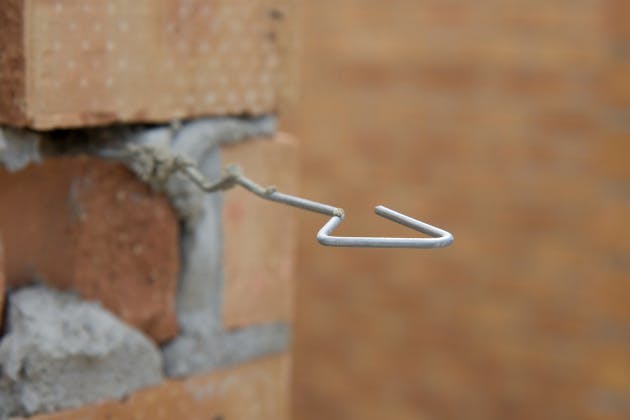Wall ties are metal connectors built into cavity walls to keep the inner and outer layers of brickwork securely in place. Over time, these ties can corrode or fail, putting your property at risk.
This guide outlines why wall ties fail, how to spot the warning signs, and how often they should be checked as part of your long-term maintenance plan.

Why you need to maintain wall ties
Over time, wall ties can corrode due to moisture and chemical reactions within the mortar or surrounding environment. If left unchecked, this corrosion can lead to expansion that cracks the brickwork, causes bulging, or even leads to structural failure. Early signs are often subtle: hairline cracks, horizontal fractures in mortar, or loose bricks. Ignoring them may result in costly repairs later on.
How Often Should Wall Ties Be Checked?
A general guideline is to have your wall ties professionally inspected every 15–20 years, especially in properties built before the 1980s, when stainless steel ties were less commonly used. However, some properties may require more frequent checks based on factors like:
- Exposure to coastal air or pollution, which accelerates corrosion
- Poor quality mortar or previous repointing, which can hide damage
- Visible cracking or movement in external walls, which may indicate a tie failure
If you're purchasing an older home or planning renovation work, it’s worth having the ties inspected as part of a structural survey.
What Happens During an Inspection?
A specialist surveyor will use tools like a metal detector or boroscope camera to assess the condition of existing ties. They’ll check for signs of corrosion, wall movement or tie spacing issues. If defects are found, options may include wall tie replacement or reinforcement using modern stainless steel solutions that won’t corrode over time.
Warning Signs of Wall Tie Failure
Look out for the following symptoms:
- Horizontal cracks following the line of wall ties
- Bulging or bowing external brickwork
- Cracks around windows and doors
- Loose bricks or mortar
- Misaligned windows or door frames
These signs often point to corroded or failing ties and should prompt a professional inspection.
FAQs
Need Wall Ties Checked or Replaced in Bristol, Swansea, Cardiff or South Wales?
If you've spotted cracks or signs of movement in your walls, it could be time to inspect your wall ties. Our team offers expert advice and trusted remedial work to keep your property safe and structurally sound. Call us today on 01639 790426.


